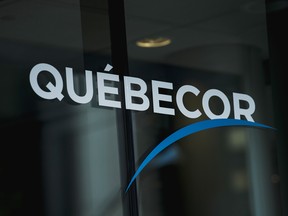The spectrum purchase is key to Quebecor’s plan to expand mobile services outside its Quebec stronghold, particularly if is not successful in acquiring Freedom Mobile from Shaw

Article content
A Federal Court judge has rejected a challenge by Telus Communications Inc. to Quebecor Inc.’s right to purchase spectrum in western Canada to develop 5G cellular technology for mobile phones.
Advertisement 2
Article content
The $830-million spectrum purchase is key to Quebecor’s plan to expand mobile services outside its Quebec stronghold, particularly if is not successful in acquiring Shaw Communications Inc.’s Freedom Mobile division. Freedom is now on the block as Shaw and telecommunications giant Rogers Communications Inc. try to convince competition and government authorities to allow them to complete their planned $26-billion merger.
Federal Court Justice Alan Diner said in a ruling Monday, and made public Tuesday, that Quebecor Inc.’s Vidéotron ltée division was eligible to bid on 3500 MHz spectrum set aside in the 2021 auction overseen by the Minister of Industry. Telus and Bell had objected, arguing that Quebecor did not meet the government’s own procedure for set-aside eligibility in the auction.
Advertisement 3
Article content
Specifically, Telus had argued that Quebecor’s Vidéotron unit was ineligible to bid because the Montreal-based company did not offer commercial telecommunications to customers in regions where set-aside spectrum was being auctioned. It further argued that the process lacked transparency.
“I find the set-aside eligibility assessment process and the Minister’s decision to have been fair and reasonable, and will dismiss the (Telus) Application,” Justice Diner wrote.
-
![Quebecor Inc. chief executive Pierre Karl Péladeau.
[Peter J Thompson] [Financial Post story by Barbara Shecter/Financial Post]](https://smartcdn.gprod.postmedia.digital/financialpost/wp-content/uploads/2022/05/peladeau-vw0512.jpg?h=96&strip=all&quality=80)
Quebecor interested in Shaw wireless, but Péladeau says telco has other options for expansion
-

Péladeau slams telecom ‘oligopoly’ as Quebecor pushes to be fourth national wireless player
Telus had sought an earlier injunction and lost that bid in October. Bell withdrew its objections before Monday’s ruling, according to an official at Quebecor. It was not clear whether this week’s decision would be appealed.
Advertisement 4
Article content
In his ruling Justice Diner said Vidéotron had indicated in its application that it qualified for set-aside in British Columbia, Alberta, and Manitoba through its affiliate, Fibrenoire, which the company claimed had customers in each of these provinces as well as Northern Ontario.
Vidéotron’s application confirmed that it had an affiliate called Fibrenoire that was registered with the CRTC as a facilities-based provider and indicated areas where it was already providing commercial telecommunications services to the general public.
Confidential documentation provided with the application “included detailed descriptions addressing how Vidéotron met the set-aside eligibility criteria, including: descriptions of the services offered by Vidéotron and Fibrenoire in their respective service areas as well as their sales and distribution networks, the numbers of clients served, and how those clients accessed their services,” the ruling said.
Advertisement 5
Article content
During the application process, on April 12, 2021, Quebecor responded to a request from government officials for additional information, providing a more detailed description of the various categories of services provided by Fibrenoire in western Canada, including “a list of customers, and detailed explanations of how business customers accessed the services, how equipment was distributed and what particular services were provided to each customer.”
Daniel Anderson, a manager in the Spectrum Licensing and Policy Branch at Innovation, Science and Economic Development Canada (ISED), gave evidence in court that he had tested these assertions by placing two anonymous calls to Fibrenoire seeking service in Vancouver, Calgary, Winnipeg and Thunder Bay, using a blocked number.
Advertisement 6
Article content
“In both cases, Fibrenoire responded that it could offer internet services but that it would not be through Fibrenoire’s own infrastructure, but rather arranged through third-party infrastructure,” the court ruling said.
Quebecor chief executive Pierre Karl Péladeau told analysts on a conference call last week that he remains committed to expanding his company’s wireless offerings outside Quebec with or without the purchase of Shaw’s Freedom Mobile operations. The expansion plan would clearly be easier with the Telus spectrum challenge gone, but analysts have also said Quebecor’s chances of obtaining Freedom improved earlier this month after the Competition Bureau moved to block the Rogers-Shaw merger, citing concerns about reduced competition and higher prices for consumers.
Advertisement 7
Article content
Péladeau has been an outspoken critic of what he calls the “oligopoly” of Rogers, Telus and Bell, and his desire to create a well-financed and viable fourth national wireless player.
When Telus lost its injunction bid in Federal Court last October, Péladeau issued a statement in which he lamented the ongoing fight, accusing Telus of “relentless efforts to block at all costs the implementation of government policy to encourage the entry of a fourth player into Canada’s wireless market in order to create healthy competition where it does not exist and lower the prices Canadians pay for mobile services.”


